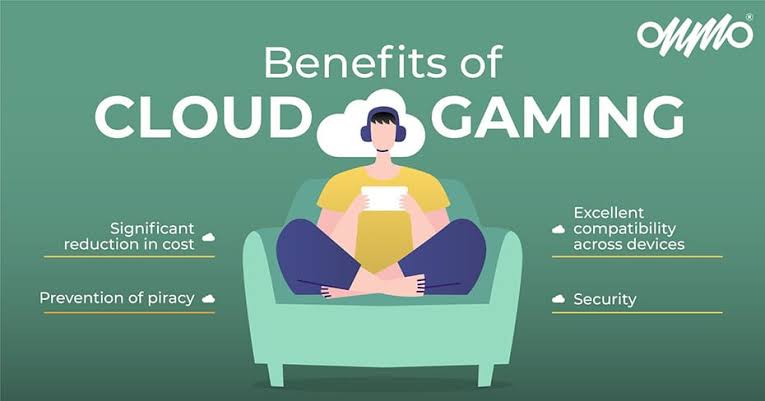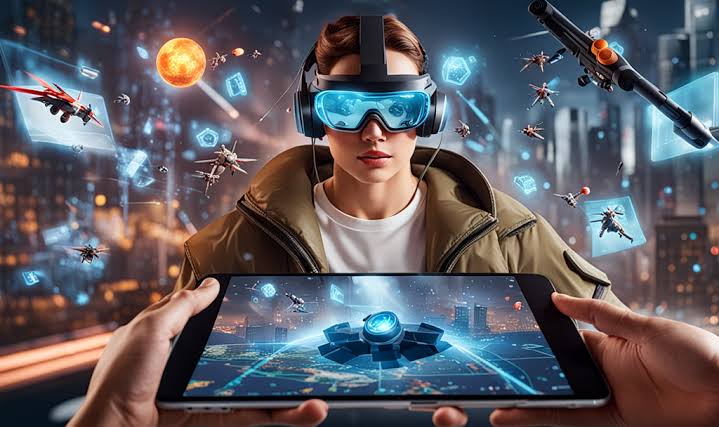The Future of Mobile Gaming: Cloud Gaming and Immersive Experiences🕹️🎮
Hey Questers, today I am talking about the future of mobile gaming: cloud gaming and immersive experiences.

Mobile gaming has transformed from simple, casual games like "Snake" on early mobile phones to complex, high-definition experiences that rival console and PC gaming. As technology advances, the mobile gaming landscape is being revolutionized by two major trends: cloud gaming and immersive experiences through augmented reality (AR) and virtual reality (VR). These advancements promise to push the boundaries of what’s possible on mobile devices, making high-quality gaming more accessible and interactive than ever before.
The Rise of Cloud Gaming:-

Cloud gaming is poised to be a game-changer in the mobile gaming industry. This technology allows games to be streamed directly to devices from powerful remote servers, eliminating the need for high-end hardware on the user's end. This not only democratizes access to high-quality games but also enables seamless gaming experiences across different devices.
Key Players and Platforms:-
Several major tech companies have entered the cloud gaming arena:-
Google Stadia:-
Google’s platform allows users to play high-definition games on a variety of devices, including smartphones, tablets, and TVs, without needing a console or gaming PC.
Xbox Cloud Gaming (xCloud):-
Microsoft’s service integrates with Xbox Game Pass, offering a vast library of games that can be streamed to mobile devices.
NVIDIA GeForce NOW:-
NVIDIA’s platform enables users to stream their existing game libraries from services like Steam to their mobile devices.
These platforms use powerful data centers to handle the processing and rendering of games, sending the video feed to the user’s device. This means even resource-intensive games can be played on modest hardware, provided there is a reliable internet connection.
Benefits of Cloud Gaming:-

Accessibility:-
Gamers can access high-quality games without the need for expensive gaming hardware.
Cross-Platform Play:-
Players can switch between devices seamlessly, picking up where they left off whether they’re on a phone, tablet, or TV.
Reduced Piracy:-
Since games are streamed and not downloaded, cloud gaming helps comb
at piracy.
Immersive Mobile Gaming Experiences:-

Beyond cloud gaming, augmented reality (AR) and virtual reality (VR) are creating new ways for gamers to interact with their virtual worlds, offering deeper levels of immersion and engagement.
Augmented Reality (AR):-

AR overlays digital content onto the real world, blending virtual elements with the user’s physical environment. This technology has seen significant adoption in mobile gaming with hits like "Pokémon GO" and "Harry Potter: Wizards Unite," which encourage players to explore the real world while interacting with game elements on their devices.
Interactive Gameplay:-
AR games often require physical movement and interaction with the environment, providing a more active and engaging experience.
Social Interaction:-
Many AR games include social features, allowing players to team up or compete with friends and other players in real-world locations.
Virtual Reality (VR):-
While VR has been more prominent on PCs and consoles, advancements in mobile VR are making it increasingly accessible. Standalone VR headsets like the Oculus Quest offer wireless freedom and are beginning to blur the lines between mobile and traditional VR gaming.
Immersive Environments:-
VR games offer fully immersive experiences where players can interact with the game world in a three-dimensional space.
Innovative Controls:-
Mobile VR platforms are developing innovative control schemes that leverage smartphones and standalone VR headsets to enhance the gaming experience.
Challenges and Future Directions:-
Despite the exciting advancements, there are still challenges to overcome:
Internet Connectivity:
Cloud gaming requires a stable and fast internet connection, which is not yet universally available.
Latency Issues:-
Any lag between the player's actions and the game's response can significantly impact the gaming experience, particularly for fast-paced games.
Hardware Limitations:-
While mobile VR and AR are advancing, they still face hardware limitations that can affect performance and battery life.
Looking forward, the integration of 5G technology promises to address many of these challenges by providing faster and more reliable internet connections, which is critical for both cloud gaming and streaming high-quality AR and VR content.
Conclusion:-
The future of mobile gaming is incredibly bright, driven by innovations in cloud gaming and immersive experiences through AR and VR. These technologies are not only making high-quality games more accessible but also transforming the way players interact with their games, offering richer, more engaging experiences. As internet infrastructure improves and technology continues to advance, we can expect mobile gaming to become an even more integral part of the entertainment landscape, captivating a growing audience of gamers around the world.
I hope you guys liked it.Stay tuned for more
amazing content and please feel free to comment down your queries.
Singing out!
Please sign in
Login and share

























